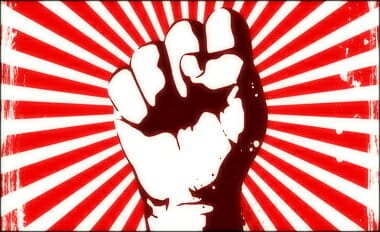Let us squint for a moment, to see if we may blur the particulars and perceive a familiar outline in an unfamiliar act. A young wealthy woman puts on vaguely military garb and travels to a far-off, less-developed land to participate in adventure. She meets there the more primitive indigenous people, admires their hunting abilities, and, in fact, poses with one of their large guns, famous for having bagged many trophies.
Q. What is she doing? A. Going on Safari.
Essentially, yes. The woman, however, would be appalled had the big gun been used to kill an elephant. But it has not. It has been used to kill American fliers.
Jane Fonda’s Adventure Tourism is, then, incorrectly, identified not as a safari but as “Ending the War.”
This was a no-cost, exhilarating adventure, all the more attractive because it took place in the purlieus of danger, but contained no danger; and it could be described as “humanitarianism,” which is an edifying title, rather than “slumming,” which is perhaps less so.
Ms. Fonda did not choose to take her wish for adventure into the veldt, where, after all, the beasts might strike back, but to Hanoi in 1969. At the height of the Vietnam War—to pose with the enemy, secure in the knowledge that her (largely inherited) position would protect her from prosecution for what was, arguably, an act of treason.
In her reliance upon this protection she was, of course, availing herself of that same privilege and culture whose destruction she was endorsing in posing by the gun.
Her pilgrimage, as Mr. Hollander points out, was not unique. Intellectuals through the twentieth century have traveled see the Potemkin Villages of Stalin’s “Workers Miracle,” the happy children of China, and the grinning, sun-drenched Campesinos [peasants] of the Island Paradise. They have believed what they were shown.
From the Webbs, and Bertrand Russell, to Susan Sontag, Jane Fonda, Vanessa Redgrave, and various movie stars of our day, these happy dupes reward themselves for feeling superior to their own country, from which country they were free to travel, and to which they were free to return, while the smiling folk they visited were locked in slave states.
See also the brave actors who endeavored to boycott, and so close, the 2009 Toronto Film Festival because it offended by showing films from Israel.
This “visiting” and political pilgrimage differs from safari in that one does not here toy with danger. It more closely resembles the Victorian practice of “going among the poor.”
It used to be called “passing out tracts.”
- David Mamet, The Secret Knowledge: On the Dismantling of American Culture (New York, NY: Sentinel Publishing, 2011), 96-98.
